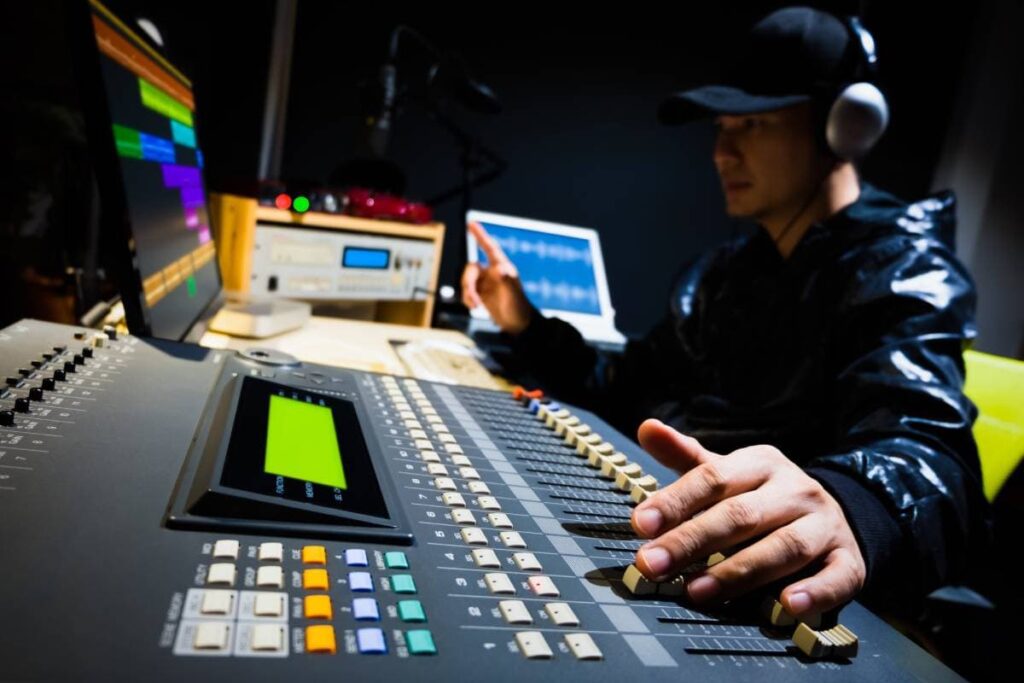Audiophiles and music producers are highly selective of their equipment to consume and make music, analyzing every beat and sound signature. The question is, can the Apple AirPod Max headphones win them over?
The overwhelming consensus is that AirPod Max headphones are of exceptional quality. It is sturdy, comfortable, and with brilliant sound and audio technology. However, they don’t measure up to specialized mixing headphones; if you can afford studio-grade headphones, get those instead.
This article is a breakdown of what makes headphones studio quality and in what ways Airpods, specifically, the Airpod Maxs, fit the brief or miss the mark.
Table of Contents
- Are AirPods Good Enough for Music Production?
- What Makes a Set of Headphones Good for Music Production?
- Conclusion
- Sources

Are AirPods Good Enough for Music Production?
AirPods, specifically AirPods Max, are some of the greatest quality headphones on the market. Despite their apparent advantages, they’re not all they’re cracked up to be when it comes to mixing and mastering, at least not compared to headphones designed for studio use.
Suppose you really like the AirPods and their audio quality and abilities. In that case, there’s no reason not to use them in the studio. However, if you take this route, you should have another set of headphones, for comparison.
Apple AirPods Max: Pros
AirPods Max are an excellent choice for the average listener, and even audiophiles might find themselves converted from the wired headphones club to the wireless fanbase.
The Airpod Maxs have the following exceptional features:
- Dynamic range: The Airpod Max produces sound that is true to “real” sound, meaning they have minimal distortion and capture different frequencies accurately.
- Large drivers: Drivers are what carry the sound through to the listener, and the larger they are, the better the sound quality. The Max has two drivers, each 40mm (1.6 in).
- Spatial audio and adaptive EQ: This feature tracks the placement of your head and the way the cushions seal on your ears to produce an immersive and consistent sound, customized to your body. This is a major perk of these headphones.
- Good sound isolation and transparency: Despite the excellent noise cancellation, these headphones don’t deafen you to your surroundings.
- Lightning jack to USB connection using RCTech USB-C Cable (available on Amazon.com): It is made of quality materials and has a premium TPE coating. Wirelessness can sometimes be an issue due to potential signal interference, but these can plug directly into your soundboard for minimal interference and convenient mixing.
- Crisp audio that isn’t overpowering: These headphones deliver superior sound while maintaining adequate volume control. They also don’t over-exaggerate certain sounds for the most part.
Music producer George Lever tested out the AirPods Max over eight months. Watch this video to see what he had to say about the AirPods Max in comparison to other headphones.
Apple AirPod Max: Cons
As you can see, AirPods are fantastic and produce excellent-quality audio. However, they aren’t perfect, and here’s why:
- Active noise canceling: Active noise canceling isn’t the ideal choice. Most professionals prefer headphones with a natural noise canceling build, so the sound isn’t muddied and less nuance is lost.
- Wirelessness causes latency issues: The reality is that wired headphones are better than wireless ones, mainly because wireless headphones are prone to signal interference and connection issues.
- Sound loss: The AirPods Max’s latency issues, noise cancellation, and incompatibility with Apple’s new lossless audio feature means that sound loss does occur, even though closed-back headphones are ordinarily less lossless.
- Costly: The AirPods are pretty pricey for something that isn’t made for professional mixing. If you’re willing to fork out a pretty penny, do it for headphones created for studio use.
- General design: Despite all of its perks, the AirPods Max is designed for a listening experience, not a producing one, and this shows in reviews done by music producers.
If you need a second opinion or want a comparison with different brands of headphones, professional music producer Jon Sine analyzes the capabilities of the Apple AirPods.
All things considered, the AirPods Max comes really close to being a good choice for mixing and mastering. Let’s take an in-depth look at the key factors that make headphones the ideal choice for studio use and see where the AirPods fall short.
Earbuds are another common piece of audio equipment many people have in their homes. You might be tempted to try and mix music on your earbuds. But don’t! I’ll tell you why in my guide, Can You Use Earbuds for Mixing? What You Need to Know.
What Makes a Set of Headphones Good for Music Production?
There are a handful of qualities that make a set of headphones fit for professional production, such as driver size, comfort, frequency reproduction, noise cancellation, and cost. Most high-end sound equipment is very costly, but with these specs, it’s not hard to see why.
Headphones are fit for professional use if they have the following:
- High sensitivity: A trademark of good headphones is the ability to accurately and clearly translate electrical signals to sound.
- Good frequency reproduction: Headphones must reproduce all frequencies in the range of human hearing, i.e., 20Hz to 20,000Hz. A reduced frequency range means reduced audio quality.
- High impedance: Pro-grade headphones must have high impedance, meaning soundwaves can easily penetrate the headphones themselves for a high-quality listening experience.
- Large drivers: The drivers are responsible for delivering the audio itself, so the more drivers headphones have and the larger they are, the better the audio.
- Noise cancellation: A natural noise-canceling and sound-isolating design is a massive plus in a pair of headphones, especially in comparison to active noise-canceling technology, which can cause less sensitivity and more interference.
- Open back: Though open-back headphones have slightly more loss, they produce better-quality sound due to minimal distortion and muffling.
Now, you might be surprised to know that the headphone jack affects audio quality, too! Read my article to find out why. Does a Headphone Jack Affect the Sound Quality?
Other Considerations
The main factors that determine whether a set of headphones is fit for studio use are technical. However, some of them hinge on comfort and convenience.
Some other considerations include:
- Wired vs wireless: Wireless headphones are more convenient, but often aren’t as worthwhile for professional use as wired headphones.
- Comfort: If you know you’ll be sitting with headphones on your head for hours at a time, you need to make sure they’re comfortable and fit your head.
- Cost: Professional headphones tend to be very expensive, but sometimes it’s better to invest in production-level equipment than to use consumer-grade headphones.
As you can see, AirPod Max headphones have most of these qualities. However, there are a few instances where they don’t quite make the cut. Even so, they’re not a bad option if you’re a die-hard Apple user or want to produce at a beginner level.
Remember that even if a set of headphones technically possesses all of these qualities, personal preference comes out on top as the deciding factor.
If you buy the best headphones on the market and they don’t feel comfortable or reflect the kind of audio you want to work with, then they’re not the best headphones for you.
Collecting high-end sound equipment can become super expensive. With all of the above factors in mind, you’ll need extensive research and try different pairs to find the pair that best suits your goal as a producer.
Since you’ve made it this far, you know that using headphones to record audio has many nuances. That’s why I decided to write an ultimate guide and cover every aspect. Don’t miss it. The Ultimate Guide to Recording Audio With Headphones
Conclusion
The Apple AirPod Max headphones are undeniably a brilliant piece of audio equipment. Despite this, professionals don’t recommend using them for mixing, mastering, or any music production. In the end, they’re best suited to a fantastic listening experience.
Sources
- Appuals: What Should You Look for in a Studio Headphone Before Buying One
- Britannica: Impedance
- edmprod: The Best Studio Headphones for Electronic Music Producers (in 2022)
- Musictech: Will AirPods Max work for music production?
- Producer Advice: Are AirPods Good for Music Production? I Was Surprised
- MacRumors: Airpods Max
- Jon Sine: AirPods Max tested for Music Production
- George Lever: AirPod Max for Music Producers?
- George Lever: Did I Get It Wrong? Airpods Max – 8 Month Review
- Streaky Studios: OH! DEAR… Apple AirPods Max Headphones
- Apple Support: About lossless audio in Apple Music
- MusicRadar: Best studio headphones 2022: expert picks for music production and mixing, tested
- Review of the ALABS IRON MINI-WL: A Powerhouse Wireless Microphone - October 4, 2023
- What is a Saturator in Music Production: A Brief Explanation - May 11, 2023
- What Are Rotary DJ Mixers? An Overview - May 11, 2023
SoundStudiomagic.com is a participant in the Amazon Services LLC Associates Program, an affiliate advertising program designed to provide a means for sites to earn advertising fees by advertising and linking to Amazon.com. We also participate in other affiliate programs which compensate us for referring traffic.

